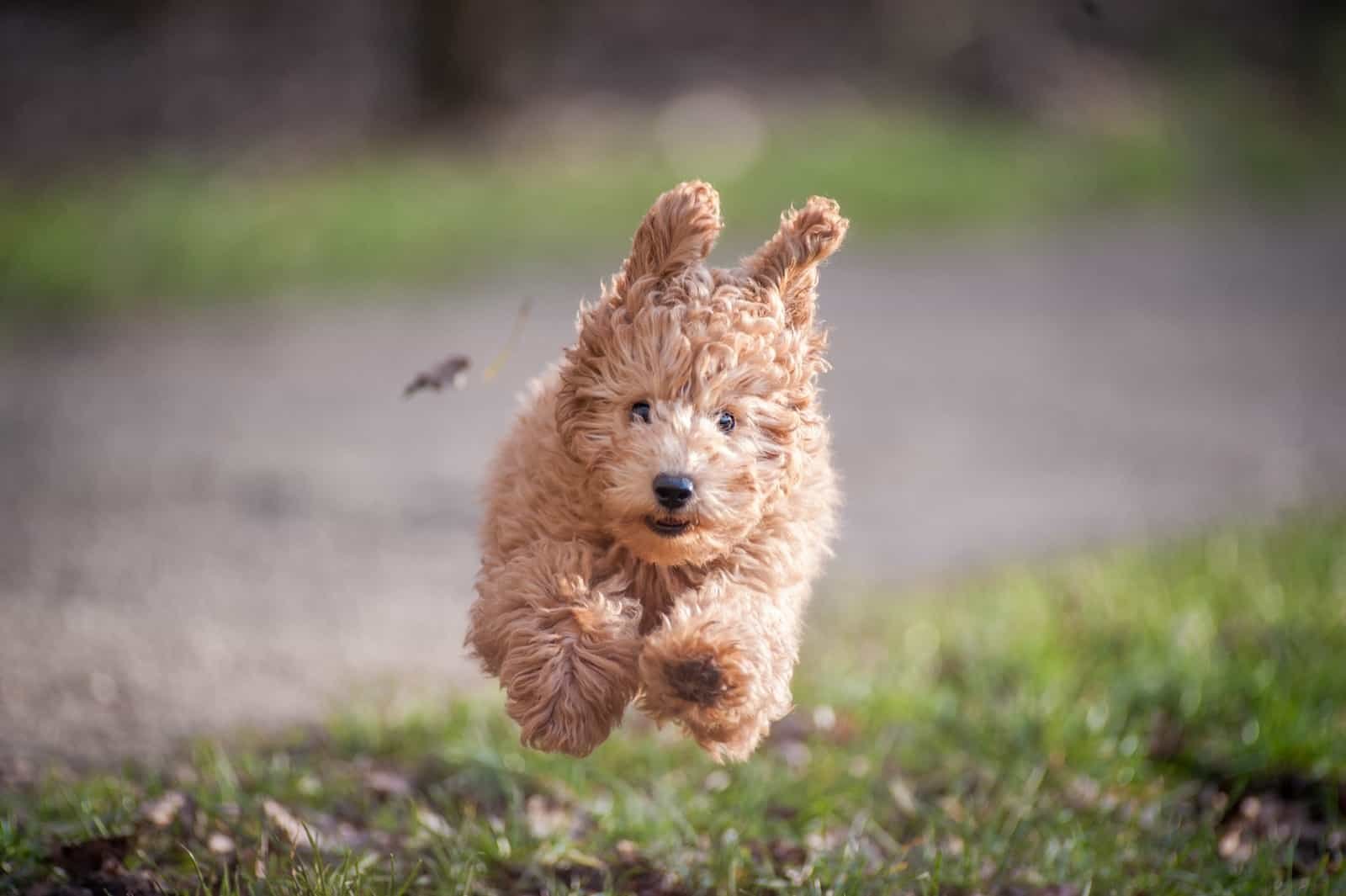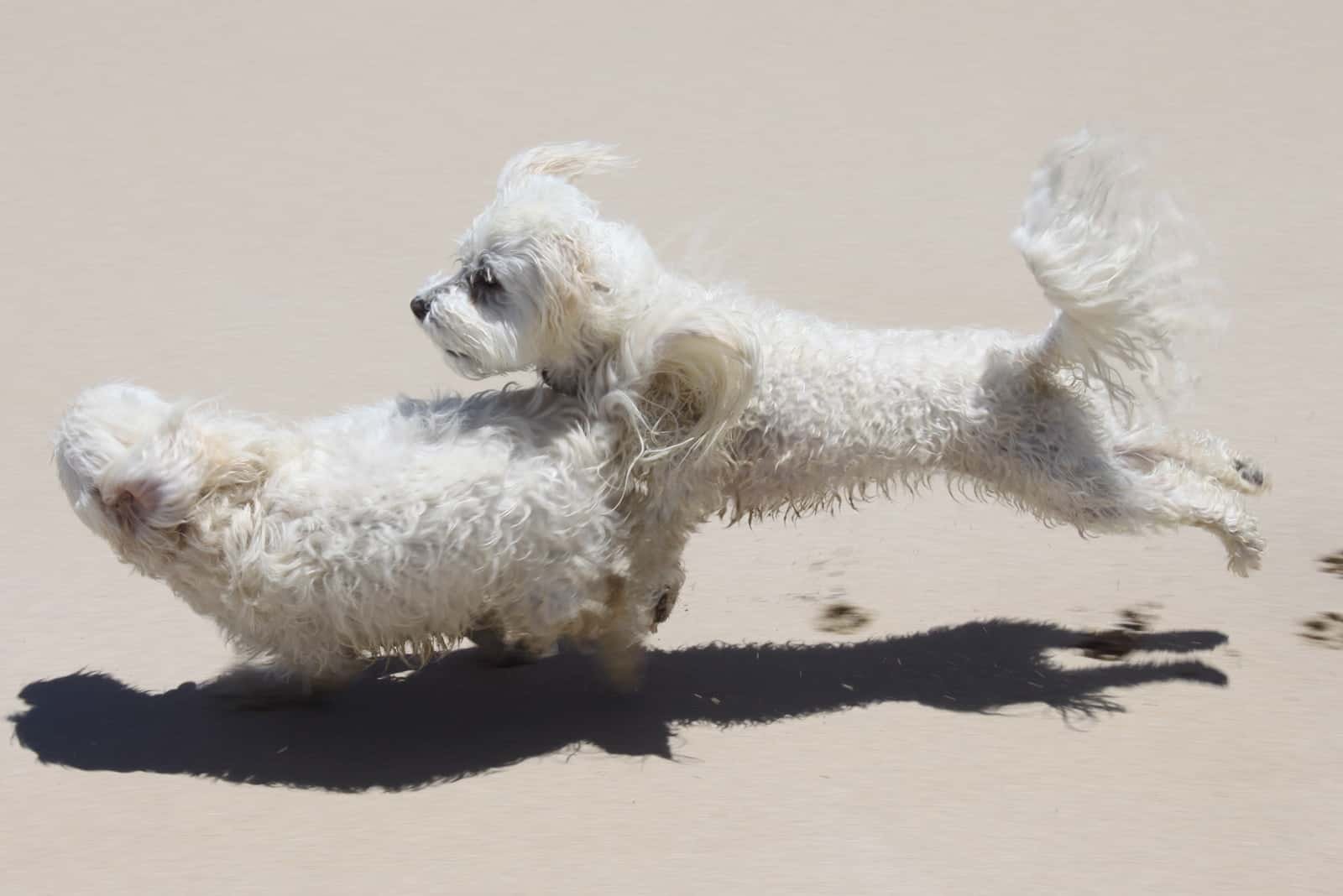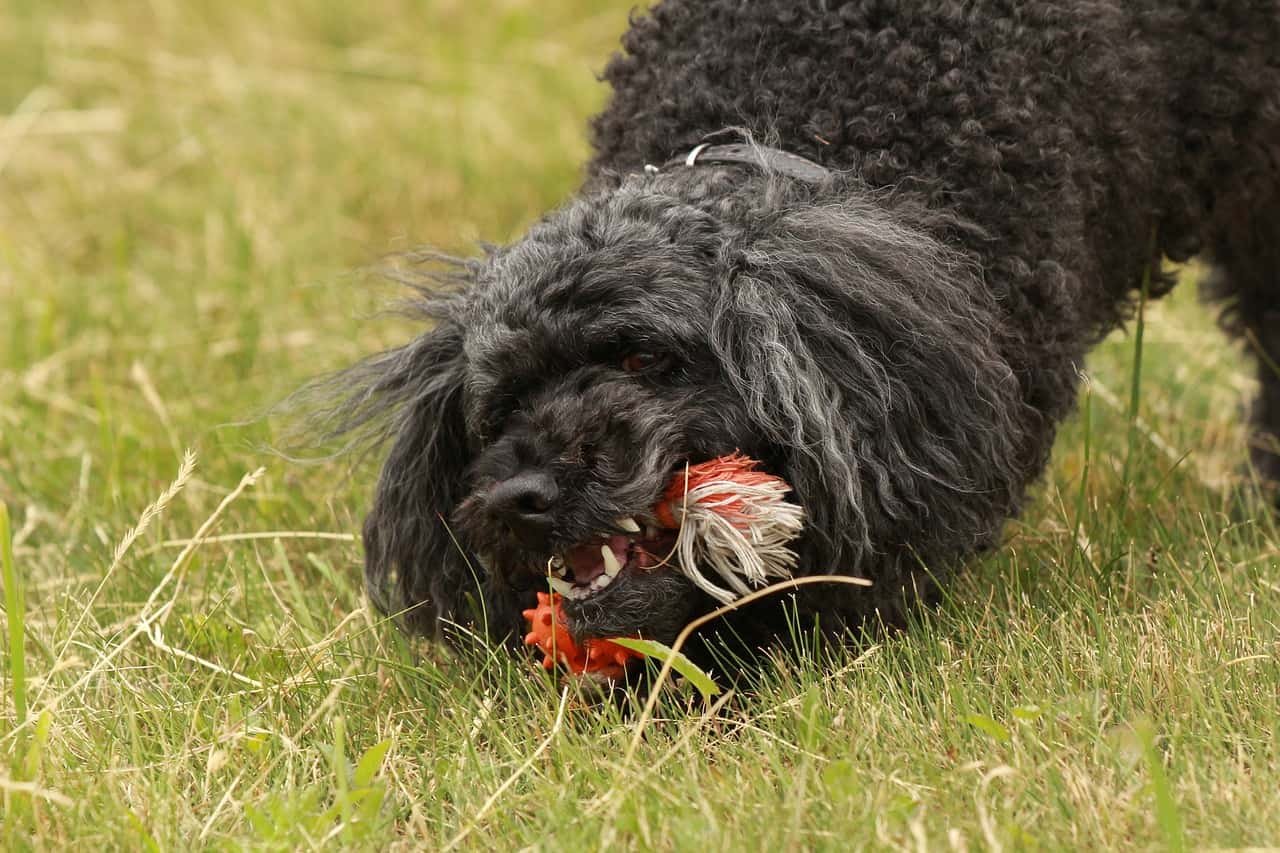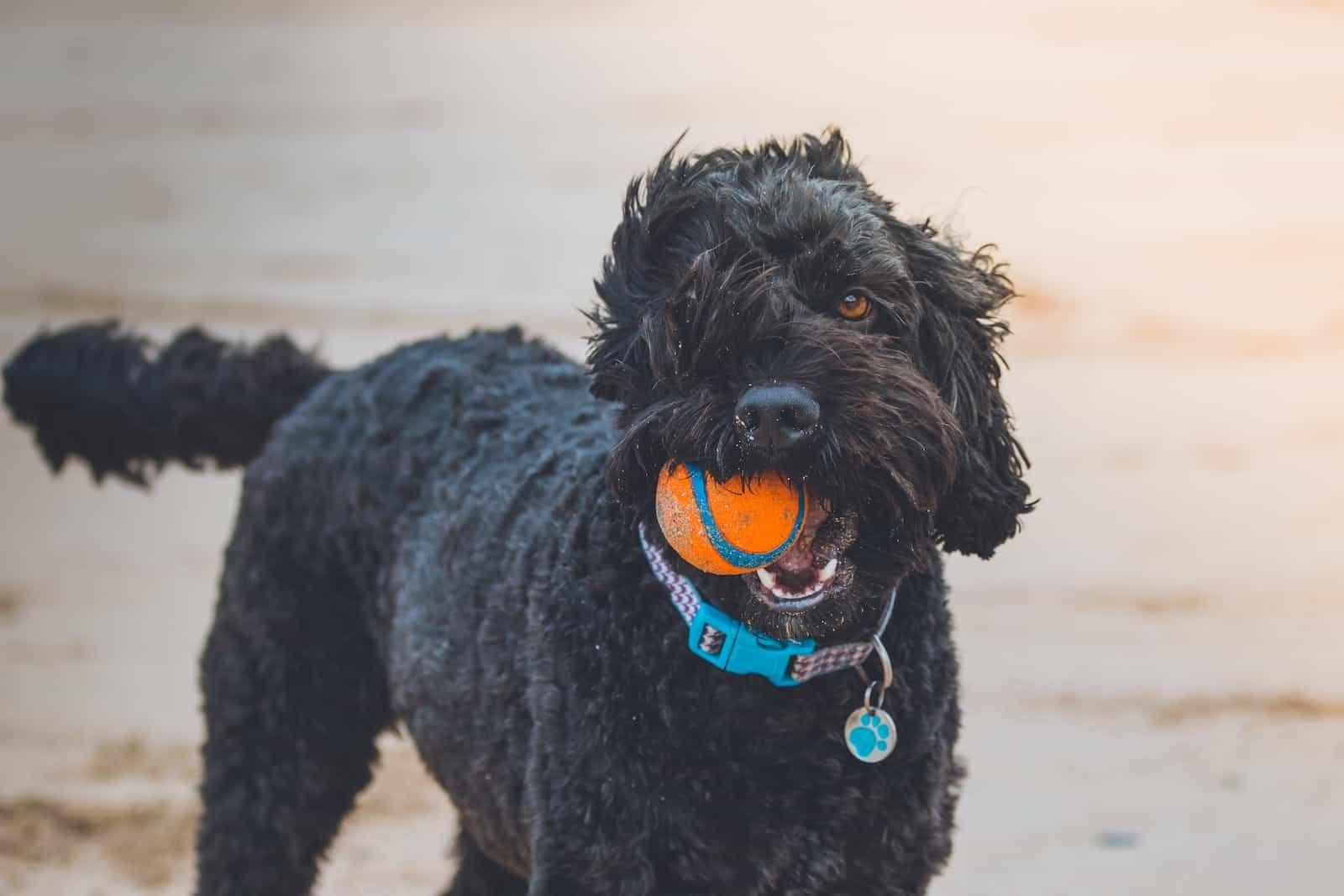
Poodles are a beloved breed of dog known for their curly coats and playful personalities. However, as with all dogs, they require regular exercise to maintain their health and happiness. In this article, we’ll explore the importance of exercise for poodles and how it can benefit them both physically and mentally.
Regular exercise can help prevent obesity, joint problems, and other health issues common in poodles. It also helps to improve their cardiovascular health, muscle tone, and overall mobility. Exercise provides mental stimulation for poodles, which can help prevent destructive behavior and improve their mood.
There are many ways to incorporate exercise into your poodle’s routine, from daily walks to interactive playtime. By making exercise a priority for your furry friend, you can help them live a longer, happier, and healthier life.
From Our Experience: As poodle enthusiasts who have worked with hundreds of poodle owners and rescue organizations over the years, we’ve gathered real-world insights that go beyond textbook knowledge. The information in this article reflects both professional expertise and hands-on experience with poodles of all sizes and temperaments.
Why is Exercise Important for Poodles?
Regular exercise is necessary for poodles to preserve their overall well-being and avoid behavioral problems caused by their elevated energy levels.
Proper exercise not only keeps poodles physically fit but also provides mental stimulation, which is crucial for their cognitive development. In this article, we explore the different exercise that poodles need and the benefits that come with regular exercise.
Exercise Frequency by Age
Exercise is an important aspect of a Poodle’s health and wellness. However, the frequency of exercise should vary depending on the dog’s age. Different age groups require different amounts and types of exercise to maintain optimal health. Here’s a guide to different age groups and their recommended exercise frequency:
Toy Poodles – Under 1 year old
For toy Poodles under a year old, it is recommended they have 30 minutes of exercise per day, split into two 15-minute sessions. These sessions should be light and low-impact, focusing on gentle walks or indoor games. Toy Poodles have soft bone tissue that is still growing, so excessive exercise or strenuous activity can lead to abnormal bone growth or hip dysplasia. Quick bouts of exercise per day are ideal for keeping them active without putting them at risk of any health conditions.
Standard Poodles – Under 2 years old
Standard Poodles, under two years old, should have 60 minutes of exercise split into two 30-minute sessions. This rule of thumb applies to both physical and mental stimulation, where indoor games or agility training can help keep them engaged.
However, it’s important to avoid over-exercising Poodles, as their bodies are still developing. Too much exercise could lead to shoulder or hip dysplasia, especially when these dogs are still in their critical growing stages.
Senior Poodles
Poodles aged 7 years and above may require shorter walks and exercise breaks throughout the day. These dogs often experience health issues such as arthritis or joint pain, making it important to maintain their exercise routine while minimizing any discomfort. Regular exercise that is mild and low-impact can help reduce these joint discomforts, while also maintaining muscle mass.
Senior Poodles should maintain regular light exercise to reduce joint discomfort and maintain muscle mass. This includes outdoor walking at a brisk pace, indoor games or brief play sessions.
Aging Poodles
For aging Poodles, it’s important to keep their body temperature warm, avoiding any cold surfaces or environmental conditions. Also, hot pavements or long walks that exceed the recommended minutes per day for their age group should be avoided.
In summary, it is essential to adjust exercise routines depending on the age of your poodle. It’s ideal to provide adequate exercise, physical and mental stimulation while avoiding any behavioral issues or health complications. Toy and Standard Poodles have different exercise frequency requirements, but all dogs deserve the proper exercise to maintain their health, happiness, and quality of life.
Benefits of Exercise for Poodles
As with any breed of dog, exercise is important for a Poodle’s overall health and well-being. Regular exercise can prevent destructive behavior and aggressive behavior, which can be common in dogs that do not receive adequate exercise per day. Exercise can also help Poodles maintain a healthy weight, promote cardiovascular health, and improve their mental and physical condition. In this article, we will explore the benefits of exercise for Poodles and how much exercise is recommended based on different age groups and activity levels.
Mental Stimulation
Poodles are highly intelligent dogs that require daily mental stimulation to remain happy and healthy. Mental stimulation is just as important as regular exercise to prevent boredom and destructive behavior in Poodles. In fact, mental stimulation can also provide physical exercise by engaging their problem-solving skills and enhancing obedience.
There are various activities and toys that can stimulate a poodle’s mind. Basic training, for example, is an excellent way to engage a dog’s brain. Simple training commands such as sit, stay, and come can also be incorporated into playtime sessions to enhance a Poodle’s mental engagement.
Scent work is another great way to provide mental stimulation for Poodles. This can include hiding their favorite toy or food in randomized places around the home or yard and encouraging them to find it. It can also include hiding scents around the home and asking the dog to seek them out using their sense of smell.
Hide-and-seek games are also great for mental stimulation. Encourage your Poodle to find hidden toys or even family members, especially with young kids. Puzzle toys are also beneficial in enhancing a Poodle’s problem-solving skills. They can be filled with treats or food and require the dog to use their intelligence to access the reward.
Besides increasing mental stimulation, these activities and toys can also improve obedience, problem-solving skills, and promote bonding with their owners. It is recommended to incorporate these activities into your Poodle’s daily routine, along with adequate exercise.
In conclusion, mental stimulation is imperative for maintaining the mental and physical health of your Poodle. Engaging your Poodle’s brain can prevent boredom, destructive behavior, and promote a healthier lifestyle. Incorporate activities such as basic training, scent work, hide-and-seek games, and puzzle toys into their daily routine to provide optimal mental stimulation.
Social Interaction
Social interaction is a crucial component of a poodle’s overall health and well-being. Poodles are sociable by nature, and regular socialization can significantly improve their disposition and behavior. Poodles that are well-socialized are happier, well-behaved, and friendlier towards both dogs and people.
One of the best ways to encourage socialization habits in poodles is by visits to dog parks. Dog parks provide excellent opportunities for poodles to interact with other dogs and receive mental stimulation from fresh scents and sights. Additionally, dog park visits provide a great avenue for exercise, companionship, and fresh air.
However, when introducing poodles to unfamiliar dogs, it is essential to proceed with caution. Owners should be attentive to their dog’s body language and behavior and make sure that the dog is not in any distress. If there is any sign of aggression or discomfort, owners should immediately remove their dog from the situation. If other dog owners indicate their dog is not interested in playing, it is best to end the playtime early.
Another alternative exercise method that poodle owners should consider is flirt poles. Flirt poles are toys that simulate prey behavior, which poodles enjoy chasing and catching. Regular play sessions with a flirt pole can provide mental stimulation and exercise while enhancing poodles’ obedience skills under their owners’ supervision.
In summary, social interaction is an essential part of a poodle’s exercise plan that provides mental stimulation and enhances their overall well-being. Regular visits to dog parks and use of flirt poles can be an excellent way to encourage socialization and promote happier, friendly, and obedient poodles. However, caution should always be exercised when introducing unfamiliar dogs. It is crucial to provide a safe environment for poodles to play and exercise comfortably.
Physical Health Issues
Physical health issues are a significant concern for poodle owners, as they can affect their exercise routine by altering the type, duration, and frequency of physical activity they can handle. One critical consideration for poodle exercise is their body temperature, which needs to be warm, especially if they are performing strenuous exercise. Hot pavement or ground can cause severe damage to their paw pads, which can lead to discomfort and injuries.
Poodles can suffer from various health issues that can affect their exercise routine. One such issue is hip dysplasia, which particularly affects larger Poodle breeds. Hip dysplasia is a hereditary condition that results in the abnormal development of the hip joint. The condition can cause chronic pain, difficulty in moving, and can significantly affect the dog’s physical activity level.
Soft bone tissue is another health issue that can affect Poodles, particularly Toy and Miniature Poodles. This condition makes their bones more susceptible to fractures and injuries, which can cause significant discomfort and lead to a reduced level of physical activity. Injuries and bone fractures may lead to a reduced level of physical activity because the Poodle requires proper rest and minimal activity for normal bone growth.
In summary, it is essential for poodle owners to be aware of any physical health conditions that may affect their dog’s exercise routine. Factors such as hot pavement, hip dysplasia, and soft bone tissue need to be considered when planning the Poodle’s exercise program. Adequate exercise with duration, frequency, and intensity, coupled with frequent visits to the veterinarian, can ensure a healthy Poodle that can enjoy physical activity without discomfort or pain.
Excess Energy Release
Excess energy is a common issue faced by poodle owners, which can lead to destructive or aggressive behavior if not addressed properly. As a content writer, it’s important to understand the importance of addressing this issue for the Poodle’s overall wellbeing.
Having excess energy impacts poodles’ behavior significantly, making them act out destructively by chewing furniture, shoes, or household items. The dog’s misbehavior can also extend to the outdoors, where they may engage in aggressive behavior with other dogs or humans. It’s crucial to provide adequate physical activity to release the excess energy to avoid these negative consequences.
One of the best ways to release excess energy is through physical exercise like walking, running, or playing fetch with toys. A rule of thumb for poodle exercise is to provide them at least 30-60 minutes of daily exercise. Standard Poodles might require a more rigorous exercise program, while Toy and Miniature Poodles might need shorter walks and play sessions.
For indoor options, puzzles or hide-and-seek games can provide both mental stimulation and exercise for poodles. Puzzles come in different levels of difficulty, and the dog must use their cognitive skills to solve them. Similarly, hide-and-seek games provide physical exercise while also stimulating the dog’s mental abilities.
In conclusion, excess energy release is an important aspect of Poodle care that cannot be ignored. The negative consequences of having excess energy, like destructive or aggressive behavior, can cause significant problems for both the Poodle and the owner. Providing adequate physical and mental stimulation through walking, running, playing fetch puzzles, or hide-and-seek games can keep the dog healthy and happy while preventing behavioral issues.
How Much Exercise is Recommended for Poodles?
As active and energetic breeds, poodles require regular exercise to maintain their overall health and prevent behavioral issues. Adequate physical and mental stimulation is a crucial aspect of their daily routine to release their excess energy and keep them mentally sharp. In this article, we’ll dive into how much exercise poodles need and the types of activities that best suit their needs.
Standard and Miniature Poodle Differences
When it comes to exercise, not all poodles are created equal. Miniature Poodles and Standard Poodles are often distinguished by their size, but this also translates to their respective exercise needs.
Standard Poodles are larger and more active than Miniature Poodles, so they require more physical and mental stimulation. This means that Standard Poodles have a higher activity level than Miniature Poodles.
For Standard Poodles, it’s recommended that they have at least 60 minutes of exercise per day, with a mix of physical and mental activities. Their size and energy level make them ideal for strenuous exercises like hiking, running or swimming, which can keep them healthy and in shape. Standard Poodles have a high risk for health issues like hip dysplasia or excess energy, which makes proper exercise even more important.
Miniature Poodles require less exercise than Standard Poodles. They need at least 30-45 minutes of exercise per day, which is enough to stimulate their minds and increase their body temperature to keep their muscle mass healthy. Miniature Poodles are content with moderately paced activities like short walks or jogs, light indoor games, or short treks.
It’s important to keep in mind that excessive exercise can cause health problems for both types of poodles. Poodles are susceptible to soft bone tissues when they are young, which can be exacerbated by quick bouts of strenuous exercise or walking on hot pavement. For this reason, it’s important to avoid excessive activity and escalate exercise as your poodle grows and develops normal bone growth.
Overall, the differences in exercise requirements between Standard and Miniature Poodles are significant, but it’s important to tailor your exercise program based on your poodle’s weight, size, age, and health conditions. Proper exercise for your poodle can help prevent behavioral issues like destructive behavior and aggressive behavior, while promoting good cardiovascular health and mental stimulation.
Different Ages Require Different Amounts of Exercise
Poodles of different ages have varying exercise needs, and it’s important for dog owners to tailor their pet’s physical activity levels accordingly. Puppies, for instance, require less exercise than adult poodles because their bones and muscles are still developing. Too much exercise can cause damage to their soft bone tissue and cause long-term health issues. For this reason, short and low-intensity exercise sessions are best for puppies.
It is recommended that adult poodles engage in daily physical and mental activities lasting 30-60 minutes to maintain their health and energy levels. It’s important to monitor their activity to prevent overexertion.
Senior poodles may require a lower intensity exercise routine than their adult counterparts as their physical abilities decline with age. Older poodles may experience discomfort or pain during exercise, so it is important to adapt the exercises to accommodate their changing needs. Low-impact exercises like short walks or swimming are ideal for senior poodles.
One great way for pet owners to ensure their poodle is getting enough exercise while also accommodating their age-related needs is to break up exercise sessions into shorter durations of 20-30 minutes throughout the day. This approach is especially effective for puppies, senior poodles, or poodles with health conditions that may need to take it easy on some days.
In conclusion, poodle exercise needs vary depending on their age. Puppies require less exercise while adult poodles need moderate to strenuous physical activity to stay healthy, and senior poodles need low-impact exercises. Breaking up exercise sessions into shorter durations can also work wonders for accommodating different age groups. Determining the exercise routine based on your poodle’s age and abilities is crucial for their overall well-being.
Rules of Thumb for Exercise Requirements
Poodles are an active and energetic breed that requires regular exercise to maintain their physical and mental well-being. However, the amount of exercise necessary can vary depending on the age, size, and energy levels of the Poodle. It would be smart to start your Poodle with at least 30-45 minutes of exercise per day and gradually increase as needed. But there are many other important factors to consider when establishing exercise requirements for your Poodle.
Age and Energy Levels:
The exercise requirements of a Poodle is directly related to their age and energy levels. Poodle puppies, for example, have a lot of excess energy and require more exercise than senior Poodles. A smart approach for puppies would be to allow them 5 minutes of exercise per month of age, up to twice a day. Adult Poodles require 30-60 minutes of daily exercise, while senior Poodles may need just 20-30 minutes, but with less intensity. It’s also important to pay attention to your particular Poodle’s activity level, as some may need more exercise than others.
Duration and Frequency of Exercise:
In terms of duration and frequency, owners should aim for at least two exercise sessions per day of 20-30 minutes, depending on the Poodle’s age and energy levels. Frequent but short bouts of exercise can be a great way to keep your Poodle physically and mentally stimulated, while avoiding overexertion.
Types of Exercise:
A variety of exercises should be planned for your Poodle to encourage both physical and mental activity. Walking or running on a leash provides low-impact physical exercise, while agility training offers more high-intensity workouts and mental stimulation. Swimming is also an excellent form of exercise for Poodles, especially for those with joint conditions. Indoor games and puzzles, such as hide-and-seek or treat puzzles, provide mental stimulation and exercise for both puppies and adult Poodles alike.
Overall, a Poodle’s exercise requirements should be tailored to their age, size, energy level, and physical condition. Providing regular daily exercise in a variety of forms will ensure your Poodle maintains good physical and mental health. By following these rules of thumb, you can create an effective and well-balanced exercise program for your beloved furry companion.
Types of Exercise for Poodles
Poodles are active dogs that require regular exercise to keep them happy and healthy. Providing your poodle with adequate exercise is important to prevent destructive behavior, aggression, and other behavioral issues that can arise because of excess energy. In this article, we will discuss various types of exercises that are safe for poodles and provide a mix of physical and mental stimulation.
Walking and Jogging
Walking and jogging are excellent forms of exercise for poodles. Regular walks can provide a brisk pace to get their body temperature warm and keep them engaged. Poodles enjoy brisk walks and can go on long walks. As a rule of thumb, it is suggested to have at least 30-45 minutes of daily exercise for a poodle. If the poodle is a toy or a miniature, then shorter walks are recommended.
Swimming
Poodles are natural swimmers due to their soft, curly coats and webbed paws. Swimming is a low-impact exercise that can be beneficial for poodles with health conditions like hip dysplasia or soft bone tissue. A good practice is to introduce puppies to water and swimming when they are at the right age and are comfortable with it. Poodles can enjoy swimming for 15-20-minute sessions, a couple of times a week.
Agility Training
Agility training is a popular activity and can provide both physical and mental stimulation for poodles. Agility training involves a series of obstacles that the poodle must navigate, including jumps, tunnels, and weave poles. This exercise helps to improve coordination, balance, and muscle mass. It can be practiced by all poodles, including standard poodles.
Indoor Games
Indoor games can be an excellent outlet for mental stimulation for your poodle. Games like hide-and-seek, fetch, and treat puzzles can help to keep your poodle’s mind active and engaged. Poodles are intelligent dogs, and these games will help to prevent boredom and destructive behavior.
In conclusion, poodles require exercise for their overall health and well-being. Incorporating a mix of physical activities and mental stimulation can help to keep them active and engaged. Poodles of all sizes can enjoy different types of exercise like walking, jogging, swimming, agility training, and indoor games. Exercising your poodle can prevent health problems and boost their heart health.
Walking/Running with Your Poodle
Walking or running with your poodle is a great way to not only provide them with physical exercise, but also mental stimulation. Poodles need exercise to stay healthy and avoid destructive behavior.
This article covers the significance of exercise for poodles, the recommended daily exercise, suitable exercises for your poodle, and how to make sure they get enough exercise. We will also touch on some common health issues that poodles may encounter during exercise and how to avoid them.
Daily Walks/Runs – Duration and Frequency
Daily walks and runs are highly important for poodles regardless of their age and size. The rule of thumb for poodle exercise is to provide them with at least 30-60 minutes of daily exercise to maintain their physical and mental health. However, the duration and frequency of exercise required may differ depending on their size and age.
For toy poodles, a casual stroll around the neighborhood may suffice, as they only need light exercise to burn off excess energy. Standard poodles require more rigorous exercise because of their larger size and higher energy levels. They may need brisk walks or runs for at least 30 minutes to an hour a day.
The age of poodles is also a factor to consider when determining the ideal duration and frequency of exercise. Puppies, for instance, have developed soft bone tissue, and strenuous exercise may cause damage to their normal bone growth. Puppies confined to a month of age should only have light exercise for shorter durations, such as quick bursts of playtime.
As poodles age, they may experience health conditions affecting their activity level, such as hip dysplasia. Shorter walks can help maintain cardiovascular health and prevent strain on the joints.
In summary, adequate exercise is crucial to the overall health and wellbeing of poodles. Regular exercise is crucial for poodles of all sizes and ages. It helps strengthen muscles, prevent destructive behavior, and ease behavioral issues. Pet owners can break up daily exercise into shorter walks or runs, like two 15-30-minute sessions in the morning and evening, to achieve this.
Using Toys to Enhance the Activity Level
Toy and Miniature Poodles can greatly benefit from playing with toys during their exercise routines. Active lifestyles are foundational for enhancing the overall health and well-being of your poodle. Not only does it help to prevent destructive behavior, but it also helps to maintain them physically fit.
Toys can keep your poodle mentally and physically active in shorter play sessions. By using toys regularly, you can increase your poodle’s exercise program to include more than just daily walks.
Toys like cones, frisbees, balls, and tunnels can help improve your poodle’s agility and coordination. Agility cones are ideal for providing your poodle with challenges to jump over and weave through. Frisbees and balls are excellent for fetching games, which can help increase their speed and stamina. Tunnels help poodles improve problem-solving skills and mental stimulation during agility training.
Toys can also play an essential role in enhancing your poodle’s overall neurological function. Giving your poodle problem-solving toys can improve their cognitive ability. Toys also help to build your poodle’s muscle mass and keep their body temperature warm, helping to prevent health issues.
In conclusion, adding toys to your poodle’s exercise routine can create fun activities that stimulate both their minds and body. Regular toy use can keep your poodle excited and active during exercise. Using toys can be very effective for Toy and Miniature Poodles, who need mental stimulation and physical exercise. Try engaging with your poodle today using their favorite toy and see how they respond to a new form of exercise!





